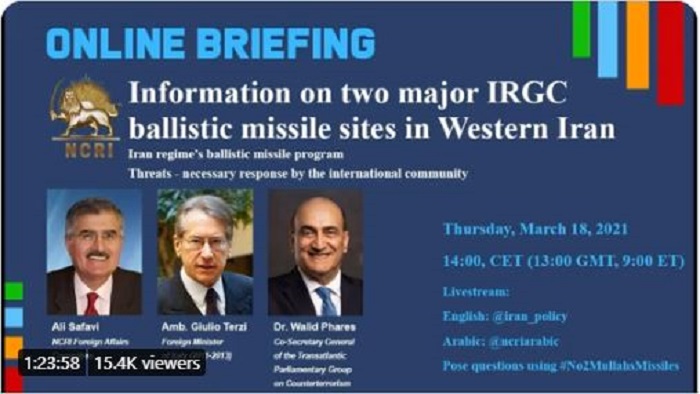
(NCRI) and (PMOI / MEK Iran): Online Press Conference on Iranian Regime’s Development and Use of Ballistic Missiles.
The National Council of Resistance of Iran held a press conference on Thursday, March 18, 2021, to discuss new revelations regarding the Iranian regime’s development and use of ballistic missiles.
Transcript of remarks by Dr. Walid Phares, Co-Secretary General of the Transatlantic Parliamentary Group on Counterterrorism, an adviser to Anti-Terrorism Caucasus in the US House of Representatives, and a Middle East expert at the online press conference on the Iranian regime’s development and use of ballistic missiles.
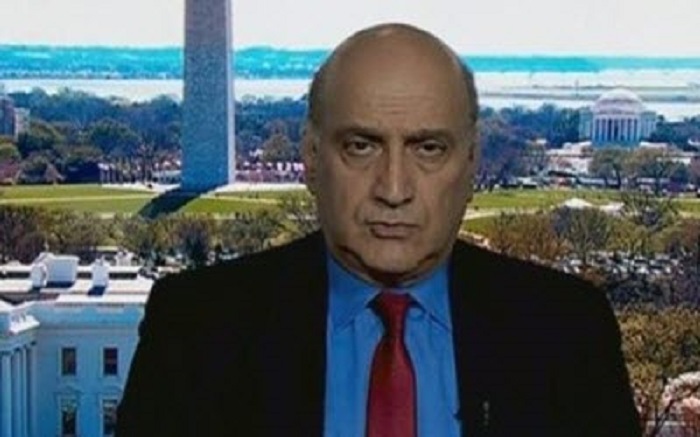
(NCRI) and (PMOI / MEK Iran): Dr. Walid Phares, Co-Secretary General of the Transatlantic Parliamentary Group on Counterterrorism, an adviser to Anti-Terrorism Caucasus in the US House of Representatives, and a Middle East expert.
The Iran deal
Dr. Ali, thank you very much for the invitation. I am honored to have also been with Minister Terzi on the same panel. We are now in Washington and, of course, in Brussels, other capitals in the region, living the moment of what we think is a return to the Iran deal. That’s what the administration is trying to organize out of Washington and their partners in Europe.
However, as the panel has already shown, there is a problem with a simple return to the Iran deal. The problem is that over the past five years, the Iran regime displayed and continued to display a behavior that would endanger, first of all, Iran and its people, the region and the Middle East, Europe and the United States, and the international community. So the discussion or the point I would like to raise are centered on the road back to any Iran deal. Obviously, those among us who will be focusing on Iran’s behavior and Iran’s behavior have three quick points, two of which have been already covered.
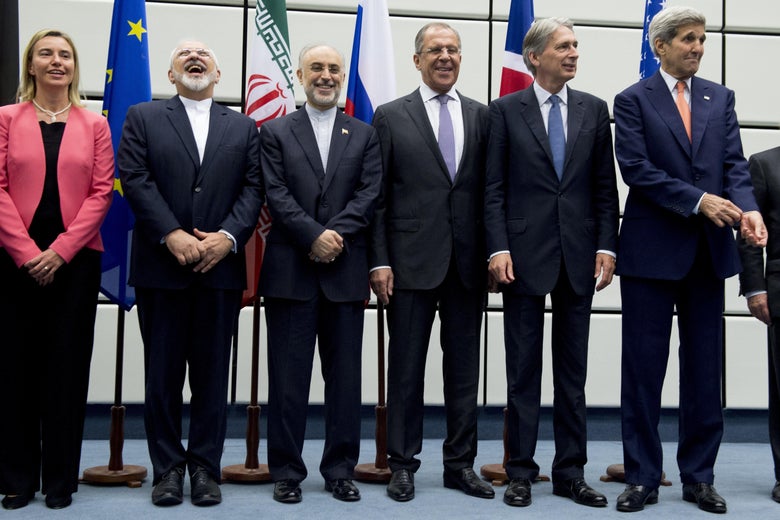
(NCRI) and (PMOI / MEK Iran): The Iran nuclear deal, also known as the Joint Comprehensive Plan of Action, signed on July 14, 2015.
Iran’s nuclear intentions
One is Iran’s nuclear intentions, two the issue of ballistic missiles, which is becoming now even with the strongest supporters of the Iran deal, a major matter because of the threat. And the third point, which I would like to summarize to you today, is Iran’s ballistic behavior. You have ballistic missiles, but then you have ballistic behavior. Not to repeat what has been said, but looking outside Iran in the region, in the Middle East, there are four countries where the Iranian regime is operating.
These are battlegrounds. So any return to the Iran deal cannot just go back to Tehran and deal with a technical matter of counting the points that the Iranian regime is doing or not doing. It has completely changed. We are talking about the geopolitics of the whole region, Yemen, Houthi militias who have controlled a large segment of a country, of a sovereign country, who are on a battlefield armed by the Iranian regime, including by missiles which are in an effective war with the legitimate government of Yemen, with the Arab coalition that includes, obviously, Saudi Arabia and Emirates and Bahrain and dozens of other countries.
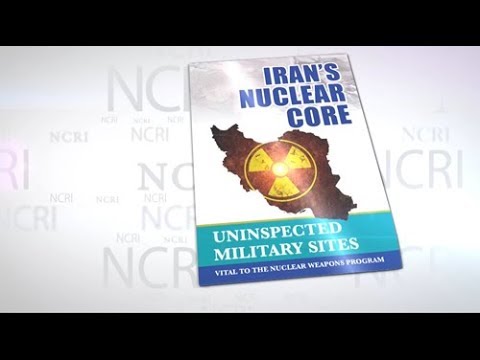
(NCRI) and (PMOI / MEK Iran): The recent revelation of the National Council of Resistance of Iran (NCRI) on the regime’s clandestine nuclear program.
Iran’s war waged on the region
And also, what is very perturbing in Yemen is that those who see militias, in addition to their war waged on the region, have had a record of abuse of human rights. That is terrible. There is not one single human rights organization around the world that has not said that there is a major problem in the behavior of those allies of the Iranian regime. The last of which was last week when dozens of African migrants. We’re not talking just about casualties in a war. African migrants were killed by the Houthi militias.
Iraq, Iran has technically, with its militias, established control over the country of Iraq, with some exceptions. It has been able to penetrate the country with its own militias through Hasht el Shabie, Hezbollah, and many other organizations. But those militias are not only controlling the government and the economy and the banks, and they are actually engaged, as is the case in Yemen, in suppressing the population of Iraq.
We all remember from TV and news there during the fall of 2019 how hundreds of thousands of young Iraqis from all communities, Arab, Sunni, Arab, Shia, Kurds, Christians, took to the streets of Iraq demanding reforms; they were met by lethal force. More than 700 Iraqi citizens of all communities have been killed by the Iranian militias. So you see, we are so far from just discussing what’s happening in those nuclear sites in Iran. We’re talking about other countries suffering from the Iranian regime, brutality, Syria, civil war since 2011. One segment of that civil war, one camp of the civil war, which is the Assad regime, is fully backed by the Iran regime.
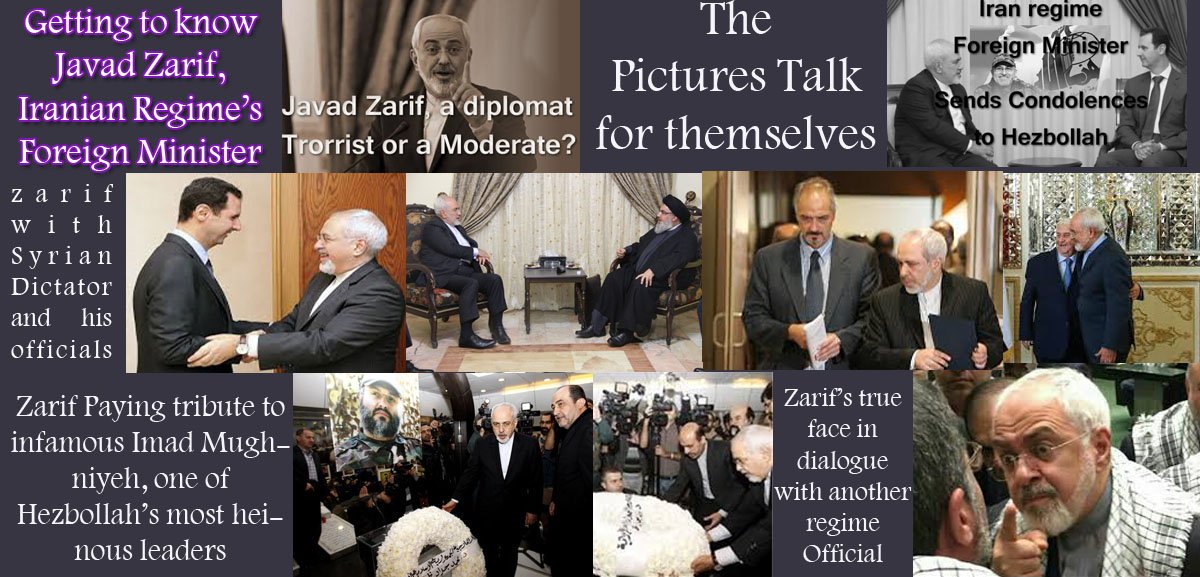
(NCRI) and (PMOI / MEK Iran): militias through Hasht el Shabie in Iraq, Hezbollah, and many other organizations.
The Iranian forces that are present in Syria
Not only this, but the Iranian forces that are present in Syria have invited militias, so-called pro-Iranian Shia militias from as far as Afghanistan. And even beyond in Asia and, of course, in Iraq and in Lebanon to fight the war in Syria, which by now, I think the numbers tell us more than 700,000 people have been killed. Five million Syrians have been moved out of their country or within their own country.
Thirdly or fourthly, we have the issue of Hezbollah in Lebanon; Hezbollah is not shy about it; they say we are the allies of the Iranian regime. Its secretary-general says I am part of the regional web and leadership of the Iranian regime. He’s not shy about it. So what we are dealing with now is an Iranian regime, quasi occupation of four Arab countries.
Bringing into those four Arab countries either direct Iranian militias, the Pasdaran, Iranian Revolutionary Guard in four other countries, or bring in supports, including military and missiles and others. So let me summarize this one important point that cannot be a return to an “Iran deal” without resolving this Khomeini’s imperialism that is occupying half of the Middle East.
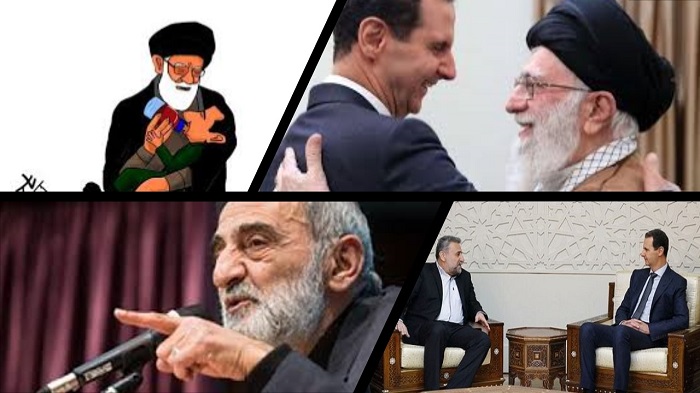
(NCRI) and (PMOI / MEK Iran): Flow of arms and cash to Assad is under the control of, Ali Khamenei.
What should be done by the international community
Now, in terms of what should be done by the international community, we know that some of the countries, to be honest, and clear about it, have already engaged Iran’s regime in economic interests. Is this a secret? It is not many European countries; Asian countries have done business with the Iranian regime.
They want to continue, and they want to go back. Even here in the United States, though the previous administration withdrew from the Iran deal, many interests are pressing the Biden administration, pressing it with all the strength they have to return quickly to the Iran deal. They don’t care about the geopolitics of it. They want to go back and do business. We have nothing against interest in doing business between countries. That’s the nature of our system, and we encourage that. But the price of going back to the Iran deal.
FASTS without even looking at everything we have covered here from human rights abuses in four countries and in Iran, which I have not even touched, the deployment of missiles, ballistic missiles in the region, the presence of Iranian controlled or Iranian units in very sensitive places by the mandate controls the passage of world economy, threats in the Gulf, attacks against Saudi Arabia.
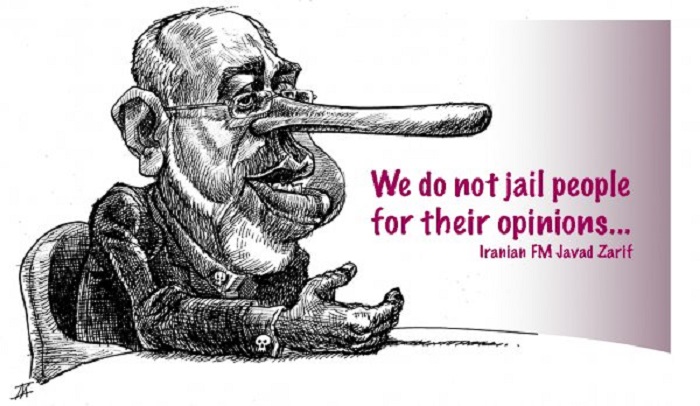
(NCRI) and (PMOI / MEK Iran): Iranian officials deceive the international community.
The security of the Middle East
All of that, and I summarized my point before I look at what should be done, in my view, indicates that the path to an Iran deal has not to be internationalized, has now to take into consideration the security of the Middle East as a whole. So here’s what I would suggest as a point we could and should discuss.
Number one, the Iran regime behavior should be at the top of the list in international negotiations for a potential new Iran deal, meaning a deal about the security of Iran and the Middle East.
And there are two points that are extremely important, which have been covered, which are the deployment of the missiles. Point A, missiles deployments. Now, as it has been covered by the panel, we have seen missiles being fired by the Houthis into Saudi Arabia and by Iran into Saudi Arabia. We have seen terrorist activities along the shores of the UAE. We’ve seen Iran-backed militias in Iraq firing missiles against the US and coalition forces. We’ve also seen Iran deploying these missiles in Syria, aiming at Israel.
We know, and we’ve seen Hezbollah, and they have claimed that they have thousands and thousands of these missiles, so if you ask me, I would say point number one, missiles, the international community must ensure that those missiles are removed from these countries because they have been deployed by a foreign force in these countries. That’s, to begin with. Second, you have participated in the process.
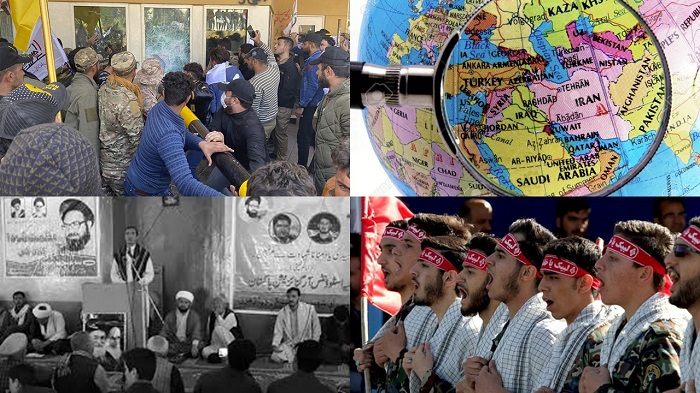
(NCRI) and (PMOI / MEK Iran): The Iranian regime’s meddling in the other countries’ affairs is an important pillar for its existence.
Who should be engaged in renegotiating a new Iran deal?
Who should be engaged in renegotiating a new Iran deal? We are with a new Iran deal. Everybody is. But who should be there? Well, in addition to the United States, obviously the European and other partners of the JCPOA, those most interested and affected are the neighbors of Iran.
We are talking about the Arab neighbors of Iran, I mean, missiles have been fired against Saudi Arabia. Live on TV, so can we imagine that Saudi Arabia and the UAE and Bahrain and Kuwait and other countries and Oman are not part of this negotiation?
They should be part of that negotiation of that round table. Second, obviously, Israel should be part of the renegotiation. If every single day, from the Houthis of Yemen to the Pasdaran of Iran, they scream and chant death to America and death to Israel, it would be the most logical step that Israel will also be part of these negotiations.
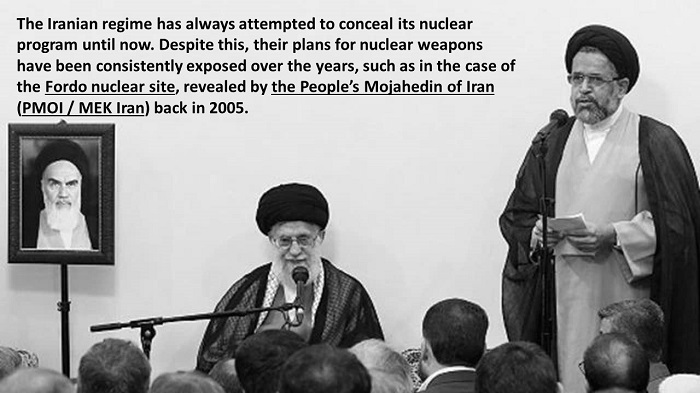
(NCRI) and (PMOI / MEK Iran): The Iranian regime has always attempted to conceal its nuclear program until now.
The international community should begin engaging with the Iranian opposition
And the last point, for the first time, I believe the international community should begin engaging with the Iranian opposition. Now, why would the Iranian opposition be engaged because we’ve seen live on TV as well for at least three months inside Iran, hundreds of thousands of Iranian citizens of all ethnic communities and religious backgrounds demonstrating and protesting the behavior of the Iranian regime?
There is another Iran inside Iran that we need to engage. That’s exactly what the US policy is trying to do in Yemen. Washington is trying to engage the Houthis and engage the legal government, the legitimate government of Yemen. That’s what we are doing everywhere.
We are talking to the Taliban and the government of Afghanistan, though the rules are enforced there, it is only logical and natural that as we are trying as the international community to resolve the threat coming from that regime, to engage with the Iranian opposition and resistance to have their voices also be heard at that table of negotiation.

(NCRI) and (PMOI / MEK Iran): The MEK has kept the media informed especially in relation to Iran’s nuclear capacity.
The actual strategic threat of the Iranian regime must be dealt with
So. I think that and this is my call on the Biden administration, but also on the US opposition, which is in Congress and the Senate and the House, we have democracy, we have an administration, and we have an opposition, and we need to be mindful of this as well as is the case worldwide that we need to be united as Americans, as the international community in making sure that the actual strategic threat of the Iranian regime is dealt with.
That should be done through political negotiations, and we need to make sure that all the items on the table of negotiations, of course, should be reviewed, starting with the missiles but also the militias.
And thirdly, to have all of those who have stakes in these negotiations, including Arab neighbors, Israel and Iran, opposition being part of that, no timetable of negotiations. And thank you very much for giving me the opportunity to speak to you today.
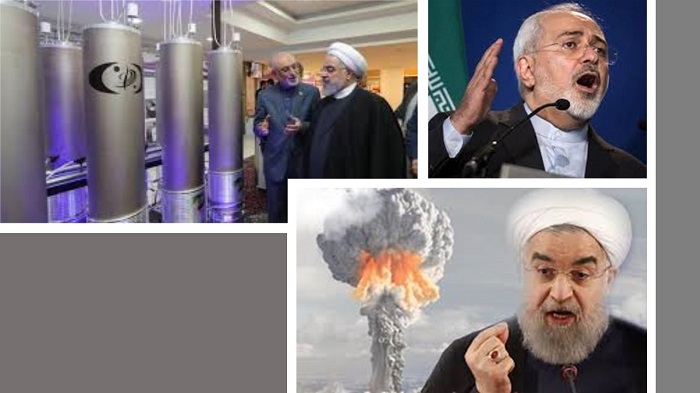
(NCRI) and (PMOI / MEK Iran): Iranian regime threatens the international community on Nuclear Deal.
MEK Iran (follow us on Twitter and Facebook)
and People’s Mojahedin Organization of Iran – MEK IRAN – YouTube
